Ruth Coles Harris was born in Charlottesville in 1928, in the thick of the Jim Crow era. Throughout the commonwealth, government services were segregated and unequal. In 1926, Charlottesville joined a handful of Virginia communities that provided high schools for African American students.
Before then, black families in the Charlottesville area had to send their children elsewhere to gain an education beyond the eighth grade. As a result, both of Harris’ parents attended boarding schools at their families’ expense. With their parents’ encouragement, Harris and two of her sisters — the great-granddaughters of slaves — all pursued higher education. Two of them, Harris and her older sister, Bernadine Coles Gines, would become the first black, female certified public accountants in their respective states.
Harris holds a bachelor’s degree from Virginia State University, a master’s from New York University and a doctorate from William & Mary.
In 1962, she became the first African American woman to earn a CPA license in Virginia. At the time, there were fewer than 100 black CPAs in the nation. Harris’ landmark achievement, however, is only part of her legacy.
 For 48 years, she was a professor at Virginia Union University in Richmond, where she served as the first director of the Sydney Lewis School of Business. Harris sat for the CPA Exam 57 years ago because she encouraged her students to take the test. She knew her words would carry more weight if she, too, was a CPA. After passing the exam, she worked part time as an accountant in addition to teaching at VUU.
For 48 years, she was a professor at Virginia Union University in Richmond, where she served as the first director of the Sydney Lewis School of Business. Harris sat for the CPA Exam 57 years ago because she encouraged her students to take the test. She knew her words would carry more weight if she, too, was a CPA. After passing the exam, she worked part time as an accountant in addition to teaching at VUU.
The Virginia Society of Certified Public Accountants (VSCPA) honored her achievements by creating the Ruth Coles Harris Advancing Diversity & Inclusion Award and naming her its first recipient in May.
The award recognizes VSCPA members who “have made significant strides in advancing and championing diversity in the accounting profession,” says Stephanie Peters, the VSCPA’s executive director.
“Dr. Harris was selected as the inaugural recipient of the award, and given her tremendous impact, we couldn’t think of a better way to honor her and her legacy than naming the award after her,” Peters says. “She broke barriers for African Americans in the profession and then spent her career pushing her students to follow in her footsteps. Naming the award after her ensures she will continue to inspire others for years to come.”
Harris has received many honors over the years, including being named by the Library of Virginia in 2015 to its list of Virginia Women in History.
Virginia Business spoke with Harris, who turns 91 in September, about her life and work, the changes she has seen and her hopes for younger generations.
Virginia Business: Can you tell me a little about what Charlottesville was like when you were growing up?
Harris: It was that city where you did not have a lot of [African American] professionals, and as a result of that, I really was not acquainted with many professions. I knew that there were dentists and physicians. I had never seen a black lawyer. We didn’t have any in Charlottesville at that time. They were teachers; they were clergy. Basically, those were the professions that I was acquainted with.
Now, most children see all kinds of professionals. They’ll see a fireman or a policeman that they can identify with. They’ll see a scientist, they’ll see all sorts of people, and they’ll say, “I think that’s what I want to be when I grow up.” Well, I couldn’t say I wanted to be an accountant when I grew up, because I’d never heard of an accountant. My great-grandparents were slaves. My grandfather worked as a janitor in one of the frat houses at the University of Virginia, and one of the fraternity brothers gave him an old manual typewriter, and he gave it to us. My mother was a schoolteacher, and my father was a dentist.
I had two sisters. Well, actually I had three, but one died as a child. I was the valedictorian of my class in elementary school, high school and college, as were my two sisters. Our parents were really sold on education, as you might guess. I looked around and saw what people were doing and, on my street, you had a family who took in laundry, and that’s how they made a living. I said, “I don’t want to do that.”
I knew I needed more education to do what I wanted to do, and I could understand why they didn’t have education, because many people couldn’t afford to send their children away to high school. Many of them didn’t have more than a fourth- to eighth-grade education themselves. That’s what Charlottesville was like when I was growing up.
VB: What did you study at Virginia State?
Harris: My sister was a business administration major, and that appealed to me, so I registered for that, and I was glad I did, but I didn’t know anything about accounting still.
All business majors had to take an introductory course in accounting, and it was my favorite subject. I could just stay up all night working.
VB: Why did you like it so much?
Harris: I like dealing with figures, for one thing, and in those days, you had to do a manual practice set. So, you had a whole set of books, and you’d be given all these transactions. Then you had to record them and just go all the way through the process to making the financial statements, and everything had to balance.
I just couldn’t go to bed until I made my own balance. I had to find all the errors. To me it was not a chore. I just enjoyed doing it because I knew everything had to balance, and then that was the challenge — to make sure that it did.
 VB: So, you received a degree in accounting in 1948?
VB: So, you received a degree in accounting in 1948?
Harris: No. There were no accounting majors in any of the HBCUs [historically black colleges and universities such as Virginia State], because there were no opportunities in the field of accounting [for black people].
In order to be a CPA, you had to have two years’ experience in public accounting, and you couldn’t get the experience. Nobody would hire you. Business administration was the major that most of the schools had.
We only had one accounting professor [at Virginia State]. Those of us who loved accounting, and there [were] only about six of us in the class, we took advanced accounting as an elective.
[The accounting professor, Dr. George Singleton] always told us that we should follow our dreams. He said it may not be in his lifetime, but at some point in time, he said, the door of opportunity is going to open. You have to be prepared so when the door opens, you’ll be ready to walk through. He drilled that in your head.
He was the fifth black graduate from the school of business at NYU. He encouraged us to go to NYU. He had done the same thing for my sister’s class, and she went to NYU, so then I had two reasons to want to go. [Editor’s note: To avoid integrating its state universities, Virginia at the time provided scholarships to help African American students pursue graduate degrees in other states.]
Two of us decided that we would go to NYU and major in accounting, so we did. Near the end of my time at NYU, I had almost finished my requirements for my degree, and I was wondering, “What am I going to do next?” My sister wanted me to stay in New York and study for the CPA exam with her. I hated New York. I wanted to get out of there as fast as possible. I just wanted to come back to Virginia, but I had no idea what I would do when I came back.
Dr. John Ellison, who was president of Virginia Union then, sent me a telegram. He said that I had been highly recommended for a teaching position at Virginia Union, and he was going to be in New York. He said he would like to come by and interview me for this position if I was interested.
I had nothing else. I had never thought about teaching. I said, “Well, I can’t go be an accountant, so I’ll go teach.” He made the offer, and I accepted the job. That’s how I got to Virginia Union.
There were several reasons why I wanted to accept that position. One, I didn’t have anything else to do. Two, I wanted to be back in Virginia, and three, he was not my husband then, but my husband and I had started at Virginia State the same year. At the end of our freshman year, he was drafted into the Army and when he came back, I was a senior. I started teaching at Virginia Union in September ’49, and we got married Sept. 2, 1950.
VB: You graduated with your master’s in 1949, but you couldn’t actually become an accountant because you were African American?
Harris: None of the firms would hire African Americans so they could get their two years’ experience. There were no black firms. There was one person who lived in New Hampshire, and he was very fair-skinned. He applied to take the CPA exam, and they didn’t have a question on the application that asked what race you were. He was so afraid somebody would find out and then they would put him out of the exam, but they never found out and he passed the exam.
I still figured, “Well, OK, one of these days it’ll change,” and it did.
VB: Why did you decide to take your CPA exam while teaching at Virginia Union?
Harris: Well, several reasons. No. 1, I still had not given up my dream of practicing public accounting. Then, I couldn’t ask my students to do something that I wasn’t willing to do, and I knew the pass rate was very low.
I’ve got to go take this exam and pass it so that [my students] will believe that they can pass, and because they will see somebody who has done it. I was encouraged when my sister passed it. She was the first black, female CPA in the state of New York. When she did that, I said, “If she could do it, I should be able to do it.”
VB: What was the preparation and testing process like?
Harris: I never took time away from my family to study for it. I would wait until they all went to bed at night, and then I would start studying. Sometimes I would study until 2 o’clock in the morning and then I’d go to bed, but I was always behind my desk at 8 o’clock in the morning. I took the exam in Richmond in May 1962, and I passed all except one part.
In November ’62, that part was given in Virginia Beach, and [because of segregation], I knew I could not stay in the hotels in Virginia Beach. The Virginia Board of Accountancy sent everybody a letter, and they sent you a list of the names of the motels or hotels and said, “Check where you want to stay, and we’ll make the reservations.”
Well, I sat and looked at that letter for a couple of days, and I said, “I don’t mind fighting a civil rights battle, but I’m really going to Virginia Beach to try to pass this examination, and then I’ll fight some more civil rights battles.”
I didn’t know anything about Virginia Beach, and I knew Norfolk was the closest city, and I didn’t know anything about Norfolk. I had to ask around to all my friends, “Do you know anybody in Norfolk?”
Finally, somebody told me about a hotel where I could stay in Norfolk. It was a black-owned hotel. I went there, and of course, I had to drive over to Virginia Beach in the morning.
In the midst of the examination, each member of the state board came by individually to apologize, and I was really upset with them because you need every minute to work on that exam, and I did not want them taking my time away from solving my problems to apologize to me.
VB: What was the bigger barrier — being a woman, or being African American?
Harris: The biggest barrier was being African American, because if you were white and you were a woman, I would think that you just didn’t get into the profession because you didn’t want to be there. I mean, there were no rules or regulations that kept you out, but it just wasn’t a profession that you found women in.
I noticed that at the college level, the students that I taught, there were a few men who were excelling, but most of the better students were female — which brings me to what a problem we [had] with trying to get employment for them. We tried to get internships. We couldn’t. We had to send one student to Northern California.
Most of the Big Eight accounting firms in the 1970s and ’80s were represented here in Richmond. I would call them and try to get some internships for my students, and they would tell me that their offices were so small that they just couldn’t hire them. At the same time, my friends over at VCU would tell me that practically all of their students were going to these same firms, and they were getting internships.
You have to get accustomed to people being rude. The IRS wanted me to send in some of the better students. I think I sent them about five or six to interview.
I said, “How did the students perform? First of all, did you make any offers?” The recruiter said, “No, I couldn’t make any job offers but there were some really good students.” I said, “Well, why couldn’t you make somebody an offer if they were all really good? I think they’re good, too. I only sent you the best that we had.”
He said to me, “I wish I could have hired some of your students. In the Internal Revenue Service, the people have to travel. We didn’t think that white women would want their husbands traveling with black women.” I thought that was insulting.
VB: What’s your view now in 2019 about the profession, in terms of diversity?
Harris: We’ve come a long way. I couldn’t even have dreamed of being a partner in a Big Four firm. Although I couldn’t do it, I just feel so good about the accomplishments of my former students. One of them is a vice president at Dominion Energy. She has done exceptionally well. One of my former students was the first African American to become a senior vice president at [Sovran Bank, now Bank of America].
VB: What else would you like to see for your great-grandkids’ or your children’s generations?
Harris: Actually, the biggest thing is, give them an opportunity. Not special privileges, but just look at them as people. Give everybody an equal chance.


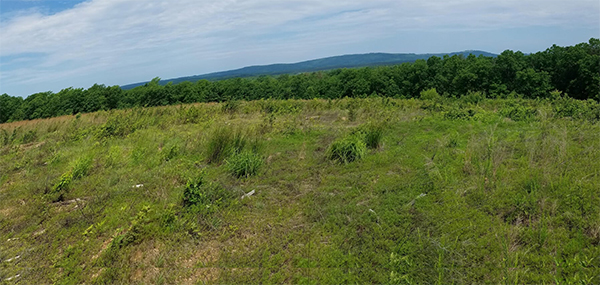 About seven square miles of Albemarle County land not far from Monticello have been protected from development by a conservation easement.
About seven square miles of Albemarle County land not far from Monticello have been protected from development by a conservation easement.
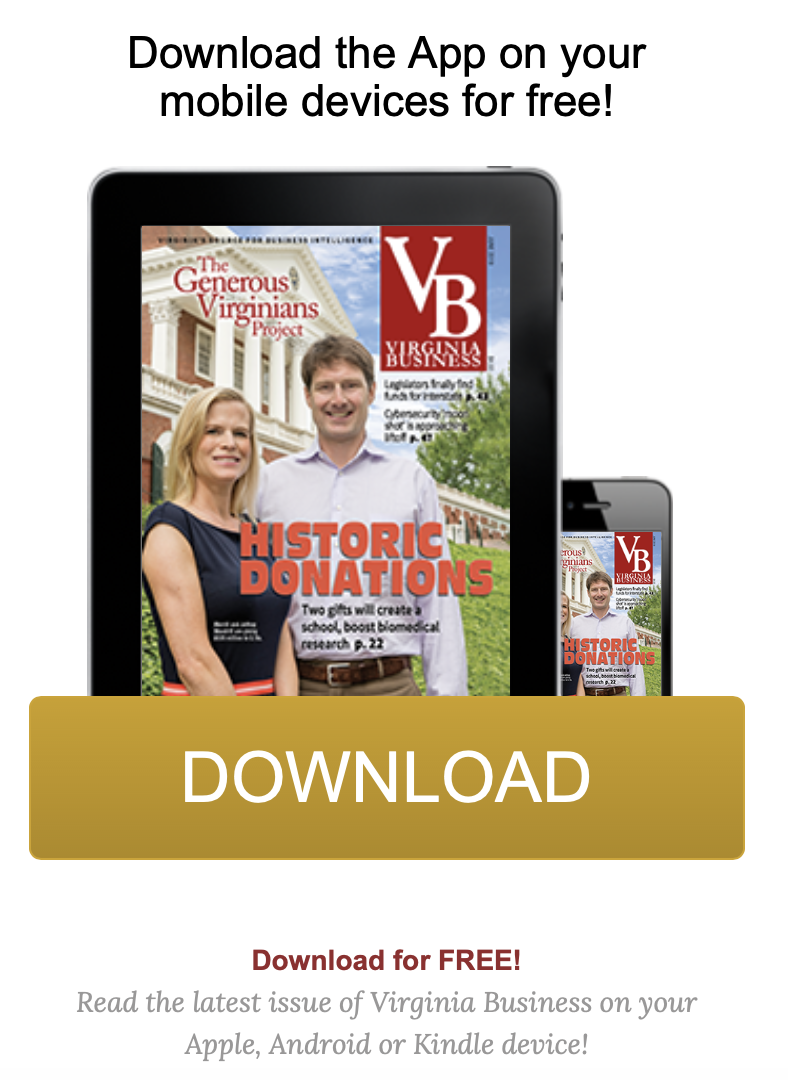
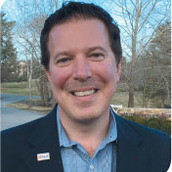
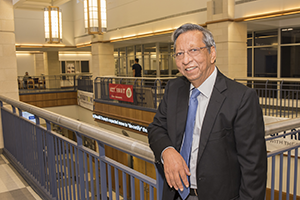
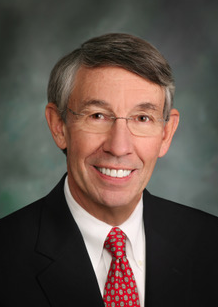
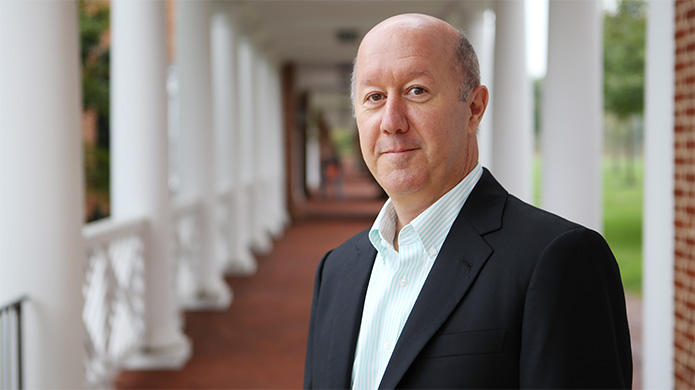 Francis E. Warnock, professor of business administration at the University of Virginia Darden School of Business in Charlottesville
Francis E. Warnock, professor of business administration at the University of Virginia Darden School of Business in Charlottesville